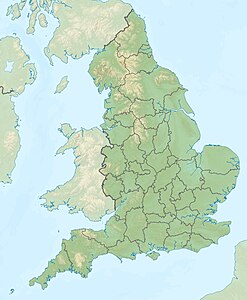Mersea Island
| Mersea Island | ||
|---|---|---|
| Waters | Estuary of the Blackwater and Colne Rivers | |
| Geographical location | 51 ° 48 ′ 0 ″ N , 0 ° 56 ′ 0 ″ E | |
|
|
||
| length | 8 kilometers | |
| width | 3 km | |
| surface | 18 km² | |
| Residents | 6500 361 inhabitants / km² |
|
| main place | West Mersea | |
Mersea Island is located in the English county of Essex , at the mouth of the Blackwater and Colne rivers, 14 kilometers south of Colchester . It is the easternmost of the inhabited islands in Great Britain . The name "Mersea" comes from Old English ("meresig" means "pond island").
There are two communities with a total of around 6,500 inhabitants on the island, which is only eighteen square kilometers in size. The small town of West Mersea with a museum and the village of East Mersea with the "Cudmore Grove (Hain) Country Park", the most interesting part of the island. The Fringringhoe Wick and Cudmore Grove nature reserves provide an opportunity to learn about the island's flora and fauna. A salt marsh has been established in the Colne Estuary since 1988 with some success.
Mersea Island is a tidal island . Since Roman times it has been connected to the mainland by a dam that interrupts the Strood Channel. The road "The Strood", the flooded road B1025 to Colchester, runs over the dam .
Prehistoric bones of monkeys, bears, elephants and hippos have been found on Mersea Island. The oldest evidence of human settlement are flint tools and the Roman finds (lead, clay and glass vessels) in the Mersea Grave Mound, a brick tomb. The Priory of West Mersea, founded by Edward the Confessor , and the Abbey of St. Quen near Rouen in France (in 1046). It is one of the oldest established monasteries in Essex .
The main income on Mersea comes from agriculture and fishing, including oyster farming . The small shipyards specialize in recreational boat maintenance and the West Mersea Yacht Club is a major sailing destination in East England.
literature
- Elsie Karbacz: Short History of Mersea 1999

